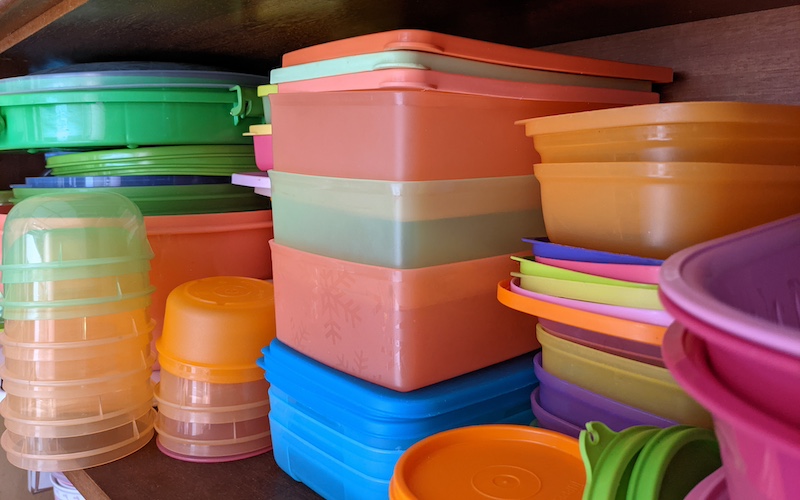
We are deluged by plastic on a daily basis. The only way to stem the flow is by passing laws that hold plastic producers accountable. Photo: Courtesy Shutterstock.
When it comes to plastic waste, the problem isn’t us.
As a Haitian American, two of my rooted values are community and food. It’s my nature to create space for people to connect over food, flowers, and festivities. I’m the sort of person who can put a themed party together in less than 30 minutes.
However, as an Environmental Justice Legal Fellow at the Conservation Law Foundation, my enthusiasm for event planning can clash with my convictions about reducing waste. After all, the waste we produce in this country generally ends up incinerated or landfilled in environmental justice communities in the U.S. or poorer communities abroad. Again and again, I am forced to consider how I can stay true to both my core values and my ethical convictions.
A Plastic Reckoning At Home
Recently, this conflict confronted me head–on in my home. After giving birth, my “village” came together to help. Family and friends from near and far rallied around my husband and me to take care of us. It was a true delight, a weight lifted off our shoulders, as the pain of childbirth, both physical and emotional, left us exhausted. The generous gifts we received filled our bellies with scrumptious food and our hearts with gratitude. But at the same time, a pile of plastic food containers was amassing in my pantry. Little did our community know that our family had been on a mission to reduce plastic entering our homes. I felt inspired by this mission when it came to my core values (community and food), but when it came to my ethical convictions (reducing waste), I felt helpless.
The truth is that options for food delivery in my rural setting are limited, so my friends and family had no real alternative than to pack their nourishing meals in to-go containers. But that’s when I realized something: When it comes to plastic waste, the problem isn’t us. The real problem is with the petrochemical and waste industries that have succeeded in flooding the world with plastic without regard for the consequences.
The Production of Plastics
We produce 400 million metric tons of plastic waste each year globally. Single-use plastic is highly profitable for the petrochemical and waste industries. Unfortunately, these industries aren’t paying the price– people and the environment are.
To begin with, much of the single-use plastic petrochemical companies create is not biodegradable. Studies show that larger plastics in our environment often become microplastics, turning up everywhere, from the ocean floor to human blood. That affects wildlife and humans. Many animals confuse plastics for food and ingest them, and some use them as nests. There is even a new word for a disease caused by plastic in seabirds –plasticosis.
Plastic is Ubiquitous At a Cost
Plastics are now so ubiquitous that they are even found in the placenta, affecting fetuses and newborns, who ingest plastics through breast milk. These microplastics have been tied to cardiovascular, immunological, developmental, and reproductive disorders, including behavioral problems in kids and cancer in adults.
My children and I face head-on the dangers caused by the petrochemical and waste industries. I have had to take significant measures to protect my family, such as replacing plastic baby bottles with glass ones to prevent chemical toxicity. However, these steps are minimal. As most of our products are already inundated with microplastics, the solution does not lie in individuals trying to restrict their use of plastics.
While I try to limit my plastic use, the truth is clear: Individuals alone cannot solve this problem. Small actions at home, while helpful, cannot begin to tip the balance toward reclaiming our health and environment from plastic. For that, it takes collective and social action.
Tighter regulations on plastic production are the only effective way to staunch the torrent of plastic overwhelming store aisles and, ultimately, our oceans. Recycling plastic is laudable and necessary, but the fact is, only some of the plastics we throw in the recycling bin ever get recycled. We need much more fundamental action that eliminates plastic at the root.
The Solution to Plastic Overload
As I wrestled this past year with reconciling my core values with my ethical convictions, I’ve rid myself of guilt. I recognize this now as a societal problem. The truth is that individual solutions are expensive and inequitable, an added burden for families without much money or time. Legislators hold the power to prioritize the public’s health and well-being by passing laws that limit the production of single-use plastic, impose more penalties on producers, and restrict the use of toxic plastics in the first place. Perhaps the most significant action an individual can take is to press elected officials to do these things today –for the sake of our health and our children’s health.
Together, it’s time we took bolder steps. That’s why CLF is pushing for laws that restrict toxic plastic in products and ensure that companies making these plastics take responsibility for cleaning them up. If we make this our collective priority, perhaps one day, our children won’t have to fight so hard to keep the tide of plastic out of their homes.



